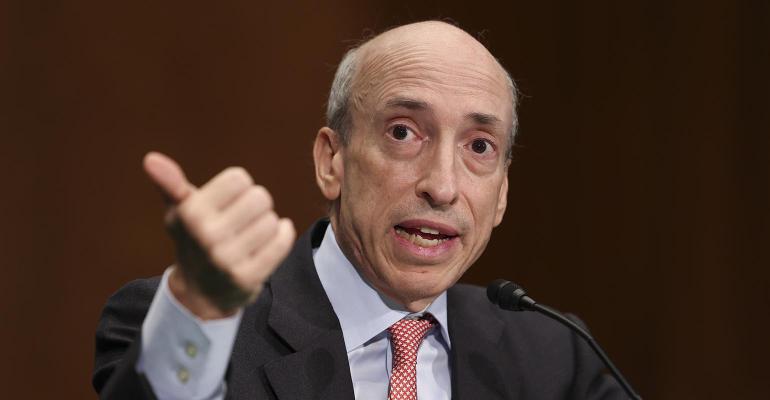(Bloomberg Opinion) -- Securities and Exchange Commission Chair Gary Gensler recently gave a speech called “Competition and the Two SECs.” It should been called “The SEC and Two Competitions.” To most people, competition is something that happens in the market. Buyers and sellers do what they want, and intermediaries offer innovations that either succeed or fail. The job of regulators is not to pick winners and losers, nor to limit choices, but to set general rules and to stop illegal practices. To Gensler, it seems, competition is the opposite. It’s something set by regulators, who tell buyers, sellers and intermediaries what to do, in order to make markets work the way regulators think best.
The difference is illustrated with the two sports analogies Gensler uses. In cross-country races, there are few rules. You can’t ride a bicycle or shoot the other runners, but these serve to define the sport and enforce general laws, not to micromanage how competitors run. This is what most people call pure competition.
Football, though, requires a 245-page rulebook, most of which is unknown to players, coaches, fans and commentators. Few of the rules are the basic definitions of the sport or prohibitions against felonies, rather they’re designed by administrators to make the game play out they way they imagine it should. If fans are getting bored by too many field-goal attempts, tweak the rules to make field goals less attractive. If the action is too slow for television, tweak the rules to speed it up. Football is a sport heavily regulated to produce a very specific kind of competition favored by administrators. This necessarily blocks innovation unless it first goes through an exhaustive regulatory process.
Gensler’s proposals are all to reduce choice by investors, capital users and intermediaries and to block innovation; all in order to produce the specific type of competition he prefers. For example, he notes large intermediaries can lower costs to investors and capital users via “scale, network effects, and access to valuable data.” He then points out, “technological innovations repeatedly disrupt incumbent business models.” This is what most people call competition. Winning intermediaries get bigger and thereby reduce costs, but smaller entities are always emerging with successful innovations. Investors and capital users can choose between the known low-cost large providers or the new possibilities offered by emerging providers.
This is the antithesis of competition to Gensler. He wants the SEC to be “vigilant to areas where concentration and potential economic rents have built up, or may do so in the future.” Break up the big companies because they might someday overcharge. Regulators, not the market, choose winners and losers, and big winners must be blocked from getting too big.
Gensler goes on to advocate regulating transparency and access. Both of these sound nice but they are limits on competition. Many investors and capital users object to disclosing all their interests, trades and positions. Today, an investor can choose to publish bids and offers in public, or to search quietly for a counterparty. A company that needs capital can do a public offering or negotiate for a private placement. Various public and less public exchange mechanisms compete for clients.
But Gensler argues everyone having the same information is more important than investors and capital users being able to choose how to arrange transactions. This may or may not be true, but one-size-fits-all transparency is the opposite of competition.
Similarly, investors and capital users today can choose what parties to deal with. An investor can go to an exchange that allows high-frequency traders or blocks them. A capital user can choose dealers that meet its standards. A market maker can restrict certain activities to retail traders only, or to passive investors but not hedge funds. A broker can exclude unreliable market makers from its routing algorithm. A hedge fund does not have to take money from investors it doesn’t trust.
Gensler prefers all market participants have access on the same terms to all transactions. He calls this more competition, but it’s a restriction on competition. Competition is only on price, not on any of the other aspects investors and capital users care about like privacy, reliability, credit, trust, business relationships, etc. Gensler’s regulations might produce more pure price competition, but at the expense of blocking all other types of competition, as well as innovation.
We are living in an era of unprecedented financial competition, not just innovations within traditional financial markets, but radical new concepts in decentralized finance and crypto exchanges. It’s not cookie-cutter regulated institutions offering the same services at slightly different prices, it’s people promoting entirely new ways of doing things. It’s easy to understand why an old-fashioned regulator like Gensler would like to put the genie back in the bottle — at least until the SEC can stare at it for a few decades. But it’s hard to understand why he uses the word “competition” for calls blocking new ideas and making everyone do things the same way.
More From Bloomberg Opinion:
- Gensler’s SEC Is Learning to Pick its Battles: Editorial
- Matt Levine's Money Stuff: Crypto Wants Some SEC Rules
- Which Retail Investors Does the SEC Want to Protect?: Editorial
Want more Bloomberg Opinion? OPIN <GO>.
To contact the author of this story:
Aaron Brown at [email protected]





